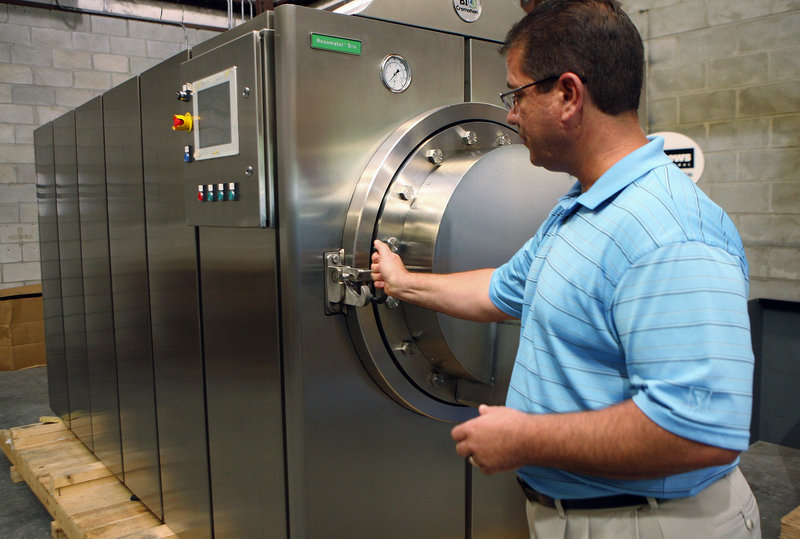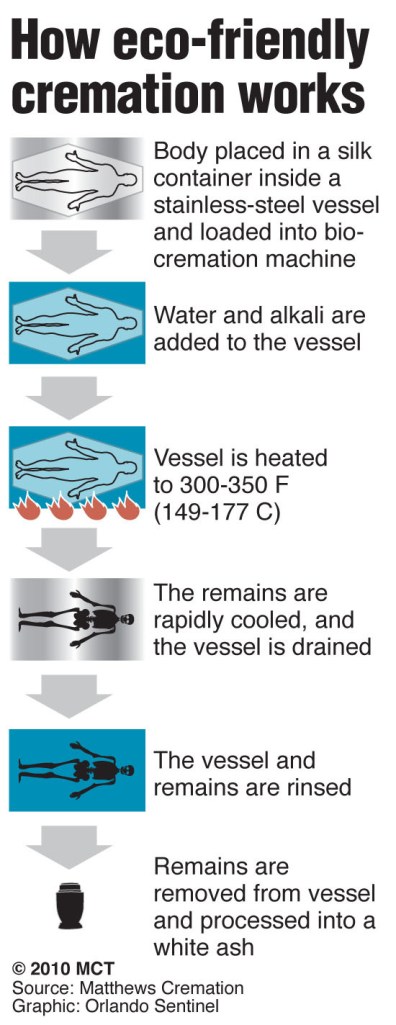ORLANDO, Fla. – Thinking about your end-of-life options? You can still be eco-friendly in the afterlife, according to an Apopka, Fla., funeral-equipment company.
Matthews Cremation is touting the latest addition to green initiatives in the funeral industry.
“Bio-cremation” involves dissolving the deceased in a heated, chemical solution that its proponents say leaves less of a carbon footprint and is an accelerated form of natural decomposition the body undergoes when buried.
“What we’re … offering is for someone who is interested in the cremation disposition that doesn’t carry the impact on the environment,” said Steve Schaal, president of the Apopka division of Matthews International, a funeral-services company.
The Anderson-McQueen Funeral Home in St. Petersburg, Fla., could perform what they say is the first non-institutional bio-cremation in the country before year’s end. The funeral home expects to get permitting approval from the city soon.
Company president Bill McQueen said the process is “gentler” than flame cremation, and families can have a chance to make an eco-friendly choice at a time when such thoughts may get pushed to the background.
He plans to charge the same fee as a standard cremation, about $2,800.
PROCEDURE IS ALKALINE HYDROLYSIS
The official term for the procedure is alkaline hydrolysis.
The departed is placed in a container that looks like a cross between a washing machine and a bank vault. A solution of mostly water and alkali immerses the body. Cranked up to 350 degrees, the mix dissolves the bodily remains. The cycle is completed in the time it takes to watch a long movie.
The process generates a sterile liquid suitable for release to water treatment recycling. The bones are removed and ground before being placed in an urn.
The Florida Legislature passed a bill last year that allows funeral homes to provide the method to the public. Schaal said it’s already legal in Maine, Maryland, Oregon and Minnesota.
The roughly 150 gallons of water involved and the high temperature means the procedure isn’t entirely without a carbon footprint, but it still bests other options.
Carbon-dioxide emissions resulting from flame-based cremation, which requires temperatures reaching 1,700 degrees, are significantly reduced. Plus, no mercury escapes from the incineration of metallic items such as hip joints and pacemakers, which remain intact and can later be recycled.
The closest comparison to its impact would be a couple of really, really hot showers.
Schaal said a two-day survey Matthews Cremation conducted recently suggested that the idea doesn’t rub the living the wrong way.
“What was surprising to me is less than 5 percent of our audience experienced an ‘ick factor,’ ” he said. “You know, the statement was made, we’re born of water and then we’re leaving of water.”
Islamic and Jewish laws prohibit cremation for their followers. The Roman Catholic church has allowed cremation for years but still maintains a preference for burial. Other Christian groups may be more accepting of alternatives.
The combination of rising environmental consciousness and a steady rise in the number of cremations, aided by a sluggish economy, could mean perfect timing for an innovative approach.
OTHER GREEN OPTIONS AVAILABLE
Cremations can cost almost half of a traditional casket burial, said John Ross, executive director of the Cremation Association of North America. He said it’s too early to determine whether bio-cremation will replace flame-based cremation.
“Probably not, but it will take on a significant market share, certainly,” Ross said.
Bio-cremation is the latest of green options in the funeral industry. But green or natural burials, which can include biodegradable caskets and no hearse or embalming, may be the most appealing option to committed environmentalists.
John Henderson, co-chairman of the Central Florida chapter of the Sierra Club, said he wouldn’t choose bio-cremation because it uses chemicals, heat, gallons of water and you end up in a container.
“I’m leaning personally more toward the green burial, so that I can decompose and be part of the earth,” Henderson said. “It’s not the gruesome aspect. I would just like to go back to nature, forever and ever.”
Copy the Story Link
Send questions/comments to the editors.




Success. Please wait for the page to reload. If the page does not reload within 5 seconds, please refresh the page.
Enter your email and password to access comments.
Hi, to comment on stories you must . This profile is in addition to your subscription and website login.
Already have a commenting profile? .
Invalid username/password.
Please check your email to confirm and complete your registration.
Only subscribers are eligible to post comments. Please subscribe or login first for digital access. Here’s why.
Use the form below to reset your password. When you've submitted your account email, we will send an email with a reset code.